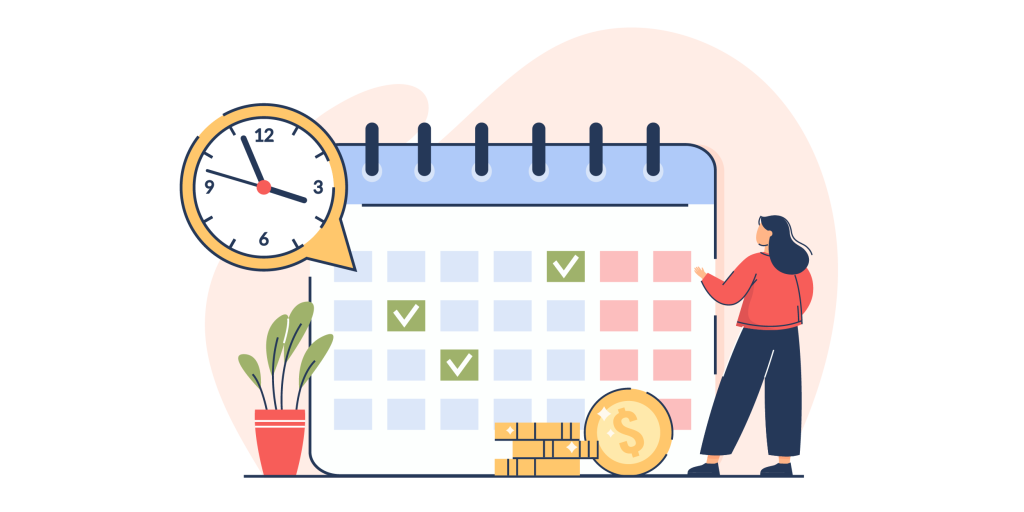
What Should You Know About Earned Wage Access (EWA)?
EWA is an increasingly popular form of on-demand pay. It’s a way employees can access the net pay they’ve already earned before their designated payday.
EWA vs Payday Loans
Some think it’s the same as an advance or a payday loan, but there are some clear differences. Payday loans are short-term and high-cost, charging employees excessive fees and high interest rates from their next paycheck. Instead, EWA allows employees to receive their income early for the hours they’ve already worked.
This means employees who finish an eight-hour shift can immediately request their pay for that shift instead of waiting a week or two. With EWA, employees can have their money readily available to cover unexpected bills or expenses.
How does EWA work?
First, you will choose a wage access provider app to integrate with your current payroll provider. This app lets you make any necessary payroll deductions before sending employees their available net wages. No changes to the regular payroll process are needed.
Then, the employee can use your chosen app to request their earned wages when they want their income. They can choose to receive part or all of their available wages — usually for a withdrawal fee, and up to a certain limit, determined by the app.
They can then opt to transfer their wages — typically either directly to their bank account or to a pay card. The pay card works like a debit card, where employees can “bank” their money and draw from the wage balance on the card when they need access to their funds.
The wage access provider will deliver the remaining wages to the employee on their regular payday. For example, if an employee earns $500 weekly and requests $200 early, they’ll receive the remaining $300 on their regularly scheduled payday.

How Does EWA Impact Business Owners?
According to a Champion Health study, financial pressure is the leading external cause of employee stress, affecting 37% of workers. Workers experiencing this type of stress spend almost 30 minutes per day dealing with it, amounting to over three weeks of lost productivity per employee each year. The Financial Post reported that employee financial stress may have cost companies over $40 billion in 2022 alone.
Employees are constantly facing pressure from inflation and other economic factors. Wage growth doesn’t keep up with these stressors, so access to early pay improves financial flexibility and health.
As a result, more employers are starting to offer EWA as a benefit and more employees say it’s a must-have. In recent surveys, around 25% of payroll professionals said on-demand pay should be a top priority for improving the employee experience.
Two EWA Payment Methods
There are two basic methods to provide EWA:
- Payroll deduction: The EWA provider sends a percentage of an employee’s earned pay to their account. On the next payday, the employer deducts the amount the employee received early and distributes it to the provider.
- Payroll settlement: The participating employee opens a settlement account with the provider or uses a provider’s payroll card. The provider deposits any wages they access early to their existing personal bank account or card. On the next scheduled payday, you directly deposit the employee’s wages to their settlement account. Then, the provider deducts any early wage amount the employee already received and instantly credits the balance to their personal bank account or card.

EWA and Employee Tenure
Since the leading external cause of employee stress is financial pressure, workers are often looking for new employment where they can either receive higher wages or quicker payments. EWA programs help reduce this pressure by making their wages available as soon as they’ve earned them.
A recent Mercator study shows this effect across different industries. It links EWA to higher employee tenure by 78 days (73%) in nursing homes, 51 days (27%) for caregivers, and 21 days (12%) in healthcare.
EWA Tax and Legal Considerations
As a relatively new payment format, many businesses are hesitant to adopt EWA due to potential compliance issues. Some regulators argue that EWA is a form of lending.
For instance, the Consumer Financial Protection Bureau (CFPB) recently issued advisory guidance addressing whether the Truth in Lending Act (TILA) and the related Regulation Z apply to EWA programs. The advisory guidance stated that covered EWA programs are different enough from the kind of products that the CFPB would consider credit. This would imply that it doesn’t fall under the definition of a payday loan.
A couple of years later, in 2022, a CFPB representative wrote a letter noting that the opinion applies strictly in cases where earned wage products don’t charge or collect any fee, voluntary or otherwise. It also only considered EWA products under TILA, not other statutes or state laws.
In response to this letter, the American Payroll Association (APA) released an open statement asking the CFPB to conduct outreach about its advisory opinion policy and take further action, if appropriate, based on data and public input.
The APA and other business interests also recommended that legislators in states that currently see EWA as a payday loan, like New Jersey, should allow EWA by separating these services from payday loans under state law.
As a result, the legal considerations of EWA for your company vary based on your state and the organization you need to be compliant with.

How Does EWA Help Employees?
The ability to access earned funds whenever necessary can be a game-changer for many employees.
Help Grow Savings and/or Build Emergency Fund
A monthly salary disappears quickly when employees have to pay rent and other bills, making it hard to build savings. EWA gives employees more control over their earnings, letting them choose when to withdraw so they can build a system that makes sense with their monthly payments.
EWA also makes it easier for employees to manage money on their terms, generally improving their financial stability. This also helps them focus on building the habit of growing savings.
Discourage Use of Payday Loans and Help Maintain Personal Credit
CNBC reported that 32% of Americans run out of money before their next payday. As a result, many take out payday loans and other expensive credit options that can quickly spiral out of control.
EWA programs, on the other hand, don’t charge interest. Since employees access their own earnings in their own time, they can avoid significant fees while staying out of debt traps.
More Money Available for Unexpected Emergencies
Since many people run out of money before their next payday, they often can’t cover unexpected charges. For example, a recent Bankrate survey found that only 44% of Americans could cover an unplanned emergency with a $1,000 price tag.
EWA helps employees close the gap between paychecks so they can quickly access the funds they need if there’s a sudden emergency. This option acts as a cushion in case something unexpected happens, offering peace of mind and reducing stress for employees in a crisis.

Boost Employee Retention with EWA
EWA is a useful benefit program that helps both employees and HR teams. Employees get help managing their finances without needing to seek other employment or sources of income. And HR Directors get to boast about increased employee satisfaction and improving staff retention.
Launching your EWA benefits program and integrating EWA into your payroll processes is simple with the right HR+Payroll platform. Is your digital HR solution flexible enough to accommodate a modern benefits program like EWA? If you’re not sure, let’s talk.
Book a demo with Empeon to experience the modern HR tech stack in action. Simple. Intuitive. Designed just for you.



